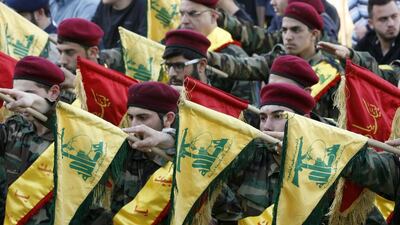Kuwait’s Al Jarida daily reported this week that Russia had suspended delivery of S-300 air-defence missiles to Iran, because Tehran, contravening a prior agreement, had supplied Russian SA-22 missiles to Hizbollah. This raised an interesting question: how will the nuclear deal with Iran signed last year affect Hizbollah’s military role in the future?
The premise that Iran has armed Hizbollah to act as a deterrent against Israel is accurate, but incomplete. The assumption is that the nuclear deal, by neutralising an Israeli attack on Iran’s nuclear facilities, has now made deterrence less essential.
But if so, why is Iran continuing to supply Hizbollah with major military capabilities? Any answer must be seen in light of Tehran’s efforts to surround Israel with areas from where attacks can be mounted against it: south Lebanon and Gaza, but also now Syria’s Golan Heights.
Iran views its relationship with Israel in a broader regional context. Just as the Islamic Republic has sought to extend its reach throughout the Arab world, defending the geographical continuity of communications lines between Iran and the Levant, it has also regarded Israel as a long-term rival, against which it has created a network of containment mechanisms.
That explains Hizbollah’s efforts inside Lebanon to shape the domestic political system around its regional concerns, above all the legitimisation of its weapons arsenal. Indeed, the on-going presidential vacuum is being perpetuated by Hizbollah’s desire to bring in a president on the party’s own terms, at the right moment, who will defend its political agenda.
There are two aspects of this deterrence game that are quite revealing. The first has to do with its framework, the second with the specific means adopted to reinforce it.
With respect to framework, Hizbollah has often seemed to favour returning to a system injecting rules into its interaction with Israel. This goes back to the April Understanding of 1996, an agreement mediated by the United States and reached after Israel’s Grapes of Wrath operation against Lebanon.
While the agreement was aimed at defending civilians, it treated Hizbollah and Israel as equals. The accord implicitly created conditions under which Hizbollah’s bombing of Israel was deemed justifiable, namely when they were in retaliation for Israeli’s targeting of Lebanese civilians.
This dual achievement – to be recognised as an equal with Israel, and to compel Israel to accept the shelling of its territory under certain circumstances – was an achievement Hizbollah never repeated after the Israeli pull-out from Lebanon in 2000. New rules of the game were introduced when the party began attacking Israeli forces in the disputed Shebaa Farms on the Golan Heights but these were less far-reaching than the April Understanding.
A second aspect of the deterrence game involves capabilities. Today Hizbollah reportedly has much more sophisticated weapons to deploy against Israel than ever before. This probably incorporates an air-defence component, which Russia’s reaction to the transfer of the SA-22s to the party this week highlighted.
It also includes more accurate missiles and vast numbers of rockets. Hizbollah has, for instance, indicated a willingness to target ammonia storage depots near Haifa, which would have devastating consequences for inhabitants of the area.
The deterrence capability also comprises tactical innovations, including engaging in land operations inside Israel. A hint of this came in 2014, when Israel fought Hamas in Gaza. The Islamist movement used tunnels to launch raids inside Israel proper. Hizbollah has threatened to do the same from Lebanon, and Hamas’s experience surely provided valuable information.
All this does not diminish Israel’s vast superiority in weaponry, but it does force Israeli officials to think twice about trying to undermine Hizbollah in Lebanon. That means Iran can maintain a presence on Israel’s border now and in the future, one that could eventually serve many purposes as the Islamic Republic extends it influence throughout the region.
In some regards this is reminiscent of China’s maritime strategy, focused on building up an infrastructure of ports to serve Chinese economic interests, as well as a network of military outposts to protect its lines of communications. Like China, Iran is thinking strategically, patiently putting pieces in place to reinforce its power both near and far.
That is why the nuclear deal with Iran, far from making Hizbollah’s weapons redundant, gave the Iranians more leeway to pursue their regional aims. The United States today does not seem to have a problem with this, with some even arguing the Obama administration is encouraging it.
Why? Because Barack Obama would like to see the emergence of a balance of power in the Middle East that, as in Europe after 1815, brings decades of stability. In that way the United States could focus on other global priorities and reduce its once paramount role as regional stabiliser. Perhaps, but a weapons build-up like Hizbollah’s can just as easily generate instability as lead to equilibrium. In other words Mr Obama’s neat political set-up may be, at best, very far in the future, after the region has suffered countless, ruinous wars. Whatever happens, Hizbollah will be a factor in most of them.
Michael Young is a writer and editor in Beirut
On Twitter: @BeirutCalling


